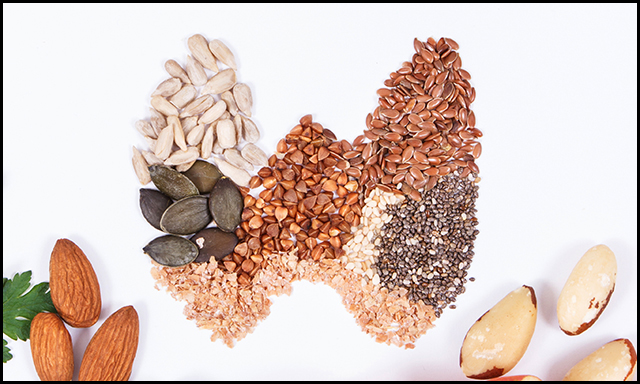
By Barbara Boules
Keeping your thyroid running smoothly is essential to good health. This small butterfly-shaped gland that sits at the base of your neck is one of your body’s hardest working parts. All day long, it produces hormones that play a role in virtually every human function, particularly metabolism, digestion, body temperature and heart rate.
This is why when thyroid dysfunction develops we can experience a host of uncomfortable symptoms. Hypothyroidism (underactive thyroid) occurs in about 12-17 percent of the population – mostly women, beginning in middle age. Hypothyroidism is often secondary to Hashimoto’s Disease, an autoimmune disorder in which the body attacks the thyroid gland, rendering it unable to function properly. Symptoms include weight gain, difficulty losing weight, constipation, feeling cold, fatigue, dry skin and hair, difficulty concentrating and joint pain. Most people respond very well to a low dose of levothyroxine. If you’re taking this medication, be sure to leave one to two hours prior to eating, as food interferes with its absorption.
Hyperthyroidism (overactive thyroid) is frequently a result of Grave’s Disease, an autoimmune disorder that leads to the production of too much thyroid hormone. If your thyroid is overly stimulated you may experience weight loss, diarrhea, feeling too warm, rapid heartbeat, fatigue, brain fog and muscle weakness. Goiter (an enlarged thyroid gland) can be a complication of both under and overactive thyroid. Medical interventions for hyperthyroidism include medications, surgery or radioactive iodine, which can lead to hypothyroidism.
The cause of thyroid dysfunction is not entirely understood, but autoimmune disease, genetics, stress and diet can all have an effect. The good news is that both types of thyroid disorder respond well to a healthy diet and lifestyle. So, let’s look at how we can best support this little workhorse.
SUPPORTIVE FOODS
Iodine
Thyroid hormones are made up of iodine, a mineral largely found in the ocean. A deficiency throws it off balance. When deficiency was prevalent in the 1920s, salt manufacturers began adding it to their products. Most of the salt we consume today is not iodized, switching to a brand that is may be wise if you have thyroid dysfunction. However, we don’t want to exceed 2400 mg of sodium (one teaspoon salt) daily. And It’s also just as problematic to get too much iodine, which can happen if we overdo the salt.
Let’s consider other sources. Lugol’s iodine liquid and seaweed are two great food sources of iodine. The daily recommendation is 150 mcg (the amount in two sheets of nori, or half of a teaspoon of dulse flakes.) Three ounces of shrimp contains about 25 percent of daily needs, and one cup of Greek yogurt, 50 percent. Eden brand adds a bit of kelp to their beans – not enough to taste, but enough to provide between 33 and 75 percent of daily needs in one half of a cup, depending on the variety of bean.
Selenium
The highest concentration of selenium in the body is located in the thyroid. Studies have shown a lower incidence of goiter and thyroid damage in participants who consumed an adequate amount of this nutrient. Ideally, we’re getting 55 mcg a day. Our richest sources of selenium include tuna, halibut, eggs, lean chicken and beef. But, nothing outshines the Brazil nut. Believe it or not, you can get all the selenium you need for a day from just one!
Zinc
Zinc plays a key role in helping the thyroid do its work. Too little can contribute to hypothyroidism, and hypothyroidism can lead to a zinc deficiency because thyroid hormones help you absorb the mineral. Men need 11 mg, and women 8 mg per day. Foods rich in zinc include legumes, nuts, seeds, lean chicken and beef. Three ounces of crab contains 50 percent of daily needs, and lobster provides 25 percent. Other good sources are yogurt and lean meats.
Vitamin D
Some studies show a link between Hashimoto’s and a vitamin D deficiency. Plus, hyperthyroidism can contribute to bone loss – another reason to be sure you’re getting enough bone-building vitamin D. Recommendations state that we need 600 IU daily. But, recent research recommends 1,000 IU, which is difficult to get from foods. Ask your doctor if you decide to supplement. Swordfish and salmon are excellent sources, as are fortified dairy products and orange juice. Ample sunlight activates our skin to produce vitamin D, but many of us don’t live in locations that are sunny year round. With concerns about skin cancer, we are better off looking to food.
Fiber
Hypothyroidism can elevate cholesterol, so fiber is your friend. A diet rich in vegetables, fruits, whole grains, nuts, beans and legumes will provide both insoluble fiber (the type that sweeps your colon) and soluble fiber (the type that lowers cholesterol.)
ANTI-INFLAMMATORY FOODS
Omega-3 fatty acids found in chia seeds, flaxseeds, almonds, and walnuts, and monounsaturated fats in olive and avocado oils are two great ways to reduce systemic inflammation. Additionally, work on fitting in goodies like berries; sweet potatoes and dark chocolate as well as flavor bombs including garlic, ginger and turmeric.
NOT SUPPORTIVE FOODS
Soy
Some research shows that the isoflavones in soy can lower thyroid hormone synthesis. However, this is usually not a problem if iodine is adequate. Choose fermented soy products like tofu or miso. Avoid soy protein isolate, the highly refined form of soy found in processed foods, including the Impossible Burger.
Wheat
While gluten is not the cause of thyroid disorder, some people have shown benefit from a gluten-free diet. Just try to eat foods that are naturally free of gluten like those listed above. Unless you have celiac disease, be mindful that gluten-free crackers, cookies, bread and cupcakes are not any more healthful than those made with wheat, barley or rye. Oats should be labeled certified gluten-free because cross-contamination could be an issue.
PROCESSED AND FAST FOODS
Don’t go for fortified foods to increase your iodine intake. Along with it, you’ll be getting way too much sodium, sugar, unhealthy saturated and trans fats, artificial ingredients and preservatives.
THE BOTTOM LINE
Symptoms of an over-functioning or under-functioning thyroid are often the result of issues including lack of sleep and poorly managed stress. If you feel that you have these wellness concerns under control, and you’re still suffering, a visit to your doctor for a simple blood test might be in order. Don’t self-diagnose. Do your due diligence and explore your options. In the meantime, get your beauty rest, daily movement and – as always – vitamins, minerals, fiber, phytonutrients and hydration powered by a rainbow, plant-based diet.
Barbie Boules is a registered dietitian and certified health coach in private practice for 17 years. She works with individuals, families, brands and corporate wellness programs. Her approach is personalized to each client – one size never fits all. She is passionate about the concepts of mindful and intuitive eating, with a focus on anti-inflammatory and pro-gut health foods. You can reach her at 312-607-6689.
 Conscious Community Magazine Dedicated to Elevating Consciousness
Conscious Community Magazine Dedicated to Elevating Consciousness



